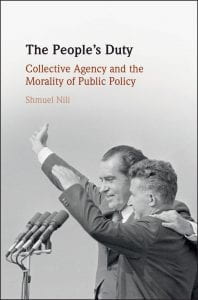Cambridge University Press, July 2019
This book takes up two questions revolving around the sovereign people in a liberal democracy as a collective agent. First, can we talk about “the people” as an agent with its own morally important integrity? Second, how should we understand ownership of public property by “the people”? After developing philosophical answers to both of these questions, I go on to illustrate their practical value in thinking through a variety of real-world policy problems, ranging from the domestic and international dimensions of corruption, through transitional justice issues, to ethnic and religious divides that threaten liberal democracy.
A symposium on the book in Critical Review of International Social and Political Philosophy (2021)
A review of the book in Perspectives on Politics (2020)
An online symposium on “The idea of public property” (Ethics, 2019) – the basis of chapter 2.
Purchase from Cambridge or Amazon
Endorsements
‘The People’s Duty argues that, while it is individual people who should remain at the focus of political theory – that, in a broad sense, is what makes the theory liberal – the perspective of the people as a group agent is essential to the proper interpretation of liberal values and to their effective implementation in practical politics. It is an original and illuminating contribution to our thinking about the state, and should command wide attention.’
Philip Pettit – L. S. Rockefeller University Professor of Human Values, Princeton University, and Distinguished University Professor of Philosophy, Australian National University
‘Who are ‘the people,’ in a moral sense, and how should we think about the people as protecting their collective integrity? We have many theoretical and philosophical treatments of private property, but what about public property? In addition to answering these questions, of great relevance for our times, Shmuel Nili’s The People’s Duty is an accessible political philosophy that takes seriously the complexity of corruption and abuse of power.’
Susan Stokes – Tiffany and Margaret Blake Distinguished Service Professor, University of Chicago
‘Nili’s pathbreaking book gives us an original way to think about the liberal state and its obligations, both to itself and to others. This provocative book will help the reader see liberalism and the state in new and important ways.’
Jeff Spinner-Halev – Kenan Eminent Professor of Political Ethics, University of North Carolina, Chapel Hill
